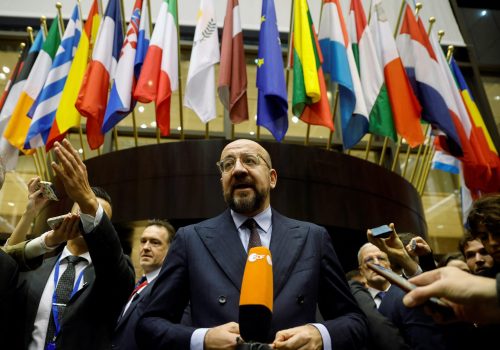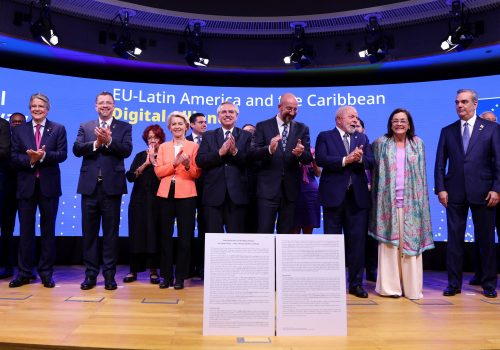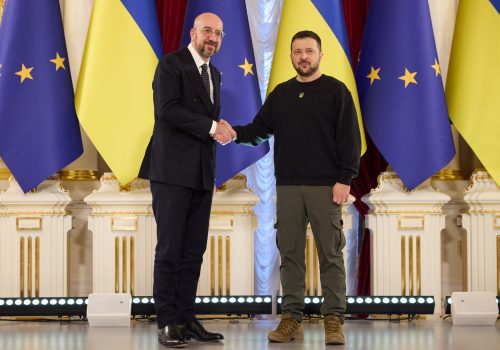Experts react to the EU starting Ukraine membership talks while failing to agree on aid
“Ukraine is Europe!” Hundreds of thousands of protesters shouted this phrase a decade ago in Kyiv’s main public square, after then-Ukrainian President Viktor Yanukovych refused to sign an association agreement with the European Union (EU). On Thursday, the European Council echoed the same idea back from Brussels when it decided to open EU accession talks with Ukraine and its neighbor Moldova (and to grant Georgia candidate status). At the same time, however, Hungary blocked a proposed fifty billion euro EU aid package to Ukraine, even as Russia continues its war on the aspiring EU member. Below, Atlantic Council experts share their insights on the two developments.
Click to jump to an expert analysis:
James Batchik: Europe isn’t leaving Ukraine in the lurch—even as Orbán plays the lone spoiler
An important signal but also a missed opportunity for Europe to step up on the transatlantic stage
The decision by EU leaders to approve launching accession talks with Ukraine is an important symbolic step and a shot in the arm for Ukrainians at a time of great uncertainty and anxiety over waning Western support for the country’s defensive war against Russia’s aggression. It is only the start of a long process of accession negotiations and reforms, and the decision cannot make up for the lack of US military aid that’s rapidly running out as negotiations on a new budget package in Congress drag on. But what it can do is provide a much-needed boost for Ukrainians’ morale and European aspirations. Ultimately, it is that European aspiration that carried much of Ukraine’s resilience, from the Maidan protests to Russia’s initial invasion in 2014, through to the darkest hours of the defense of Kyiv in early 2022. It is those same democratic, European aspirations of Ukraine that instilled so much fear in Russian President Vladimir Putin that he chose to launch a full-scale military invasion.
However, the approval of accession talks alone, by itself—without an agreement on the EU’s fifty billion euro macro-financial assistance bundle for the next four years, a decision on which was pushed to a January summit amid Hungarian Prime Minister Viktor Orbán’s blocking—is short on practical support for Kyiv. It is a missed opportunity for Europe to step up on the transatlantic and geopolitical stage at a critical time. Imagine the powerful signal at this moment for Ukraine of a package of launching accession talks and of fifty billion euros in financial assistance that is military assistance in so many ways, too. Bundle that for once with the otherwise disparate national announcements on additional military aid commitments—the delivery of another German Patriot battery, a Finnish pledge of doubling ammo production, and others—and the EU could have sent four unmistakable messages at once: one of timely reassurance to Ukraine; one of defiance and determination to an increasingly bullish Moscow (and even Beijing); another of encouragement to do the right thing to Washington; and one to its detractors at home and abroad of the EU shouldering its responsibility and stepping up.
—Jörn Fleck is the senior director at the Atlantic Council’s Europe Center.
A triumph for Ukraine’s army of tireless civil society activists and government reformers
Ukraine officially submitted its application to European Union membership on February 28, 2022, just days after Russia launched a full-scale invasion to topple its government and subjugate it to Moscow. Less than two years later, Ukraine’s European choice remains clear, as the European Council agreed on December 14 to open accession negotiations with Kyiv. The Council’s decision was excellent counterprogramming to Putin’s highly-choreographed call-in show earlier in the day, where he riffed on destroying and “de-Nazifying” Ukraine. The brutal Russian war continues in Ukraine’s east and south, but Putin has undoubtedly lost the battle for Ukrainian hearts and minds and has consolidated Ukrainian society against him; 80 percent of Ukrainians want to join the EU, while just 2 percent want to join a Russian-led bloc. Few could have imagined such public consensus when Russia illegally annexed Crimea and instigated the war in Donbas in 2014 in the wake of Ukraine’s Euromaidan Revolution.
The beginning of accession talks is a triumph for Ukraine’s army of tireless civil society activists and government reformers, who have worked to improve their country and better integrate it with Europe. Ukrainian President Volodymyr Zelenskyy and his team working on Euro-Atlantic integration deserve great credit, too, and will now take up the difficult, and painstakingly long task of readying Ukraine for the EU single market. Kyiv will need to enact deep, lasting reforms and be flexible enough to negotiate political roadblocks that will crop up throughout the accession process, while fighting back against Russian aggression keen to slow Ukraine’s shift toward Europe. Yet with Ukraine’s indomitable spirit on display every day, few would dare bet against its eventual accession to the EU.
Moldova—with whom the European Council also agreed to open accession talks—faces its own problems of malign Russian aggression as it prepares for EU membership. Russia continues to back criminal elements in Moldova with the intent of destabilizing the country’s politics, and it still controls the breakaway Transnistria region. And yet Moldovan democracy is stronger than ever and the country’s European trajectory has never been more clear. The Council’s opening accession talks with Chisinau is a massive credit to Moldovan President Maia Sandu’s commitment to reform and democratic principles. Moldova is now closer to Europe than many ever thought possible.
—Andrew D’Anieri is a resident fellow at the Atlantic Council’s Eurasia Center.
Georgia’s candidate status needs to include more EU economic and financial integration
The European Council’s decision to grant candidate status to Georgia is a victory for the Georgian people, who have been protesting against signs of their country’s democratic backsliding, such as the foreign agents law proposed earlier this year. While Georgia’s path to EU accession remains a long and laborious one, the EU should provide economic and financial incentives to Georgia even before accession and formal economic integration.
The EU already has existing frameworks and projects that enhance Georgia’s trade and connectivity with Europe. They only need to expand. For example, the EU and Georgia signed an association agreement in 2014, which opened the EU market to Georgian businesses and products through the Deep and Comprehensive Free Trade Area agreement. The EU has also removed visa requirements for Georgian tourists in the Schengen zone since 2017. Brussels remains the largest provider of financial assistance to Georgia and also its largest trading partner. Tbilisi is working on solutions for increasing cross-border e-commerce with the EU by 50 percent.
Apart from strengthening trading ties and giving Georgia access to the European market, the EU has also invested in capacity building to prevent sanctions evasion through the Georgian banking system. For example, in 2022, the Council of Europe delivered a training course on financial investigation to Georgian prosecutors and investigators as part of the CyberEast project. Such projects with Georgia should expand, and should also include representatives of US financial regulatory agencies to deepen transatlantic engagement with Georgia, Ukraine, and other Eastern Partnership countries.
The EU’s decision to grant candidate status to Georgia empowers and gives hope to the Georgian people, who have demonstrated their readiness and ability to keep the government accountable and ensure that the country follows the European path. Increasing Georgia’s economic and financial integration with the EU even before accession will strengthen the Georgian people’s ability to continue doing so.
—Maia Nikoladze is an assistant director within the Atlantic Council’s GeoEconomics Center.
Europe isn’t leaving Ukraine in the lurch—even as Orbán plays the lone spoiler
There is both a positive and a not-so-positive story to tell from the European Council Summit. The positive: It is a big deal that the European Council opted to open accession negotiations with Ukraine. The Council’s go-ahead continues Ukraine (and Moldova) along the path toward membership in the European Union at a record pace. It is a testament to the Ukrainian government’s efforts to enact the tedious and difficult reforms and to the seriousness with which EU leaders consider Ukraine’s EU future.
The opening of negotiations is a historic milestone, but the work is just beginning. Kyiv will now have to run the gauntlet to align and reform just about every sector of its society and government with the EU’s prized acquis. This process has taken years for other applicants—none of which were simultaneously fighting a war for survival. Nevertheless, Ukraine has been serious about reform and was rightly rewarded. EU member state leaders, (minus one creative abstention) for their part, rightly demonstrated the bloc’s geopolitical weight and its ability to use enlargement to promote long-term stability and security in the region. The Council’s decision is also a confirmation of the bloc’s normative power. EU membership means something for the people of Ukraine: a symbol of a free, democratic Ukraine situated squarely in the West. The decision shows that Europe isn’t leaving Ukraine in the lurch and is serious about welcoming it into the fold.
On the less positive side, the Council failed to agree to the fifty billion euro aid package for Kyiv as part of the EU’s top-up of its seven-year budget, punting the decision to January at the earliest. The package, meant to guarantee Ukraine much-needed macroeconomic assistance over the coming four years, is in many ways more important in the short term than the approval of accession negotiations. With additional US aid to Ukraine stymied in the US Congress and the war’s grinding pace, the EU needed more than ever to step up and provide Ukraine with predictable aid and send a message that Europe could continue its world-leading long-term tangible support for Ukraine even in difficult times. European leaders have already stressed that aid will continue to flow bilaterally, and the EU still has existing aid to dole out. But the failure to reach an agreement does diminish the EU’s historic decision on accession negotiations and, more generally, Europe’s ambitions as a geopolitical actor. Orbán continues to play the lone spoiler, using aid to Ukraine as blackmail to unlock Hungary’s frozen EU funds and putting the limits of the EU’s consensus decision-making on full display.
An extraordinary summit of EU leaders will pick the Ukraine aid question back up in January. EU leaders are bullish on securing a deal on aid to Ukraine in January. Hopefully they are proven right.
—James Batchik is an assistant director with the Europe Center.
A crucial announcement that came just as Putin reiterated his goal of crushing Ukraine
Ten years after Ukrainians flooded onto the Maidan in Kyiv to make their choice of a European future clear, the decision at the European Council summit in Brussels on December 14 to open negotiations with Ukraine on accession is a practical and symbolic milestone on Ukraine’s path toward European integration.
In its recommendation to open accession negotiations with Ukraine in November, the European Commission reported that Ukraine made steady progress on all seven benchmarks that had been laid out when Ukraine was granted candidacy status in the spring of 2022. This included progress on laws relating to de-oligarchization, the rights of national minorities, and the strengthening of anti-corruption institutions, although the Commission clarified that it will take time to fully implement its recommendations. Several hurdles remain on the path to EU membership and negotiations will take many years. Of the non-founding members of the EU, accession talks have lasted nine years on average. The recent protests by Polish farmers at the Ukrainian border underscore the difficulties of integrating Ukraine’s agriculture sector, which is the largest in Europe, to align with the European Union’s Common Agricultural Policy, for example.
Despite these future challenges, the EU leaders’ decision is a critical morale boost to Ukraine’s leaders and the Ukrainian people. As Ukrainians continue to fight against Russian aggression and in favor of their country’s European future, the announcement was greeted with elation in Kyiv. A strong majority of Ukrainians back EU membership, with support spread evenly throughout the country. Zelenskyy hailed the move as a “victory” for Ukraine and for Europe, and Minister of Foreign Affairs Dmytro Kuleba called it a “historic day.”
The announcement couldn’t have come at a more crucial moment. Earlier in the same day, Putin reiterated his goal of crushing Ukraine at his annual marathon press conference, repeating his twisted retelling of Ukrainian history to try to justify his revanchist invasion. Meanwhile in Washington, negotiations over border and immigration policy have put a hold on a new aid package for Ukraine as legislators prepare to head home for a holiday recess.
The European Council’s summit was not without its own drama, Orbán was publicly committed to blocking progress on Ukraine’s accession before the summit. Meetings were held between the Ukrainian and Hungarian foreign ministers and among Orbán, French President Emmanuel Macron, German Chancellor Olaf Scholz and European Commision President Ursula von der Leyen. Zelenskyy was even seen talking with Orbán on the sidelines of Argentinian President Javier Milei’s inauguration in Buenos Aires. Orbán left the summit room when the European Council voted to open accession talks, a move reportedly suggested to him by Scholz. Orbán clarified after the announcement that Hungary “did not participate in the decision,” but made clear that Hungary had allowed the other EU countries to “go their own way.”
Europe is clearly stepping up its support for Ukraine. European countries have overtaken the United States in the total amount of aid sent to Ukraine over the course of its struggle against Russia’s full-scale invasion. The European Council’s decision only reinforces Europe’s commitment to support Ukraine as it faces Russia’s war of aggression. By entering into EU accession talks, Ukrainians are now one step closer to the future for which they are fighting.
—Benton Coblentz is a program assistant at the Eurasia Center.
Further reading
Thu, Dec 14, 2023
Historic breakthrough for Ukraine as EU agrees to begin membership talks
UkraineAlert By Peter Dickinson
European leaders have agreed to officially start EU membership talks with Ukraine in a morale-boosting victory for Ukrainians as they defend their country against Russia’s ongoing invasion, writes Peter Dickinson.
Tue, Dec 12, 2023
Galvanizing Spain’s presidency for the next chapter
Issue Brief By Ignacia Ulloa Peters, Diego Area, Felipe Félix Méndez
Spain’s presidency of the Council of the European Union in 2023 was a unique opportunity to deepen partnerships between the Euro-Americas. Through shared values, common interests, and complementary capabilities, the EU, US, and LAC have the potential to advance lasting solutions to the most pressing challenges facing these regions and the world.
Fri, Dec 8, 2023
Ukraine in the EU would be a game-changer for Europe’s decarbonization drive
New Atlanticist By Théophile Pouget-Abadie, Francis Shin
Both decarbonization and Ukraine’s accession will require reforms to the bloc's internal decision-making processes.
Image: European Council President Charles Michel, Prime Minister of Spain Pedro Sanchez and European Commission President Ursula Von der Leyen pictured during a European council summit, in Brussels, Friday 15 December 2023. BELGA PHOTO NICOLAS MAETERLINCK. No Use Belgium.


